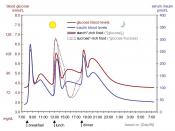Diabetes is a disorder of metabolism. Most of the food we eat is broken down into glucose which is the form of sugar in the blood and the main source of fuel for the body. After digestion, glucose passes into the bloodstream. Insulin, a hormone produced by the pancreas, large gland behind the stomach must be present in order for glucose to get into cells for growth and energy.
When we eat, the pancreas is supposed to automatically produce the right amount of insulin to move glucose from blood into our cells. However, people with diabetes, the pancreas either produces little or no insulin, or the cells do not respond appropriately to the insulin that is produced. So glucose builds up in the blood, overflows into the urine, and passes out of the body. Thus, the body loses its main source of fuel even though the blood contains large amounts of glucose.
Diabetes is associated with long-term complications that affect almost every part of the body and it often leads to blindness, heart and blood vessel disease, strokes, kidney failure, amputations, and nerve damage. Uncontrolled diabetes can complicate pregnancy, and birth defects are more common in babies born to women with diabetes.
There is not only one type but three types of diabetes currently.
Type 1 diabetes is an autoimmune disease which results when the immune system turns against a part of the body. In diabetes, the immune system attacks the insulin-producing beta cells in the pancreas and destroys them. The pancreas then produces little or no insulin. Someone with type 1 diabetes needs to take insulin daily to live. At present, scientists believe that both genetic factors and environmental factors, possibly viruses, are involved causing body's immune system to attack the beta cells.
Type 1 diabetes develops most often...



Sentence structure, mon ami, sentence structure.
An intersting essay, although you have a HUGE problem with sentence structure. You've got a few nonsensical sentences, and several run-ons. A good essay though.
3 out of 3 people found this comment useful.